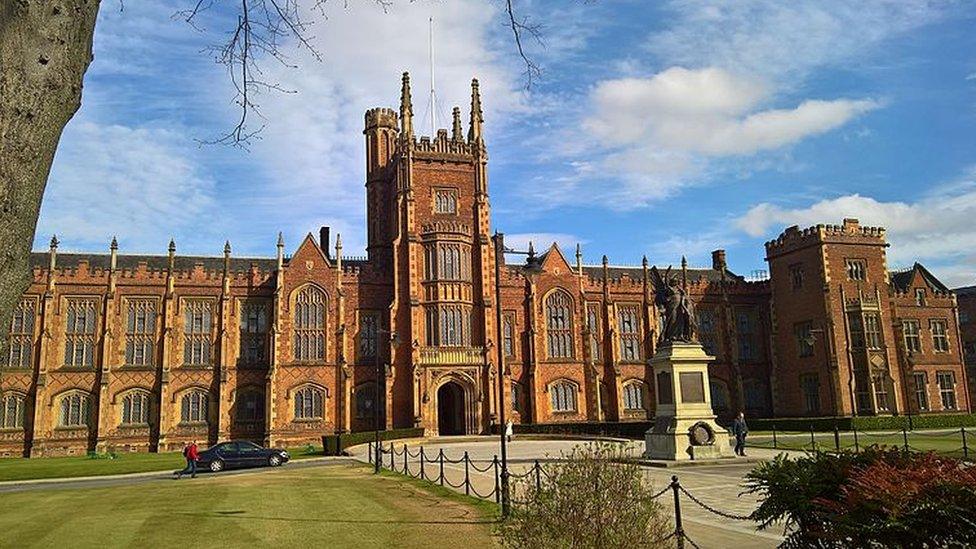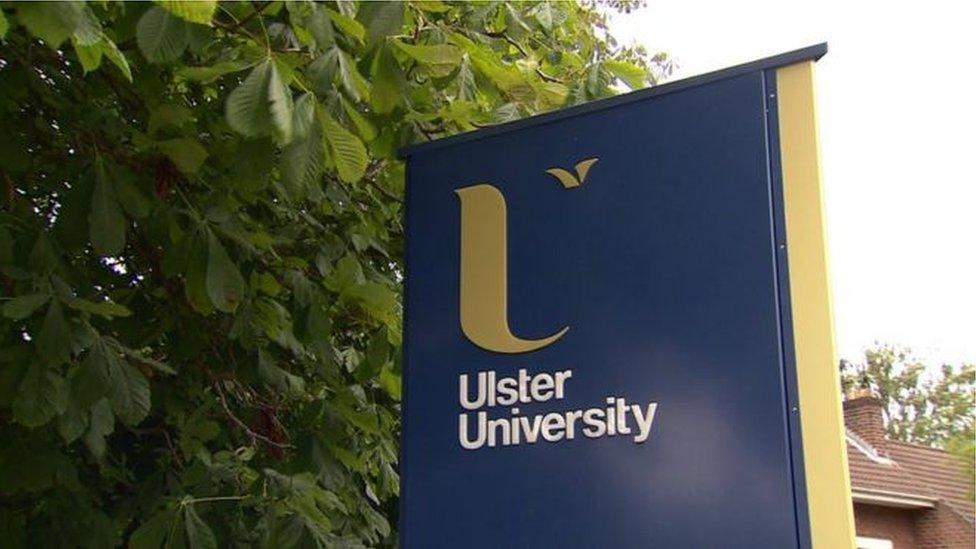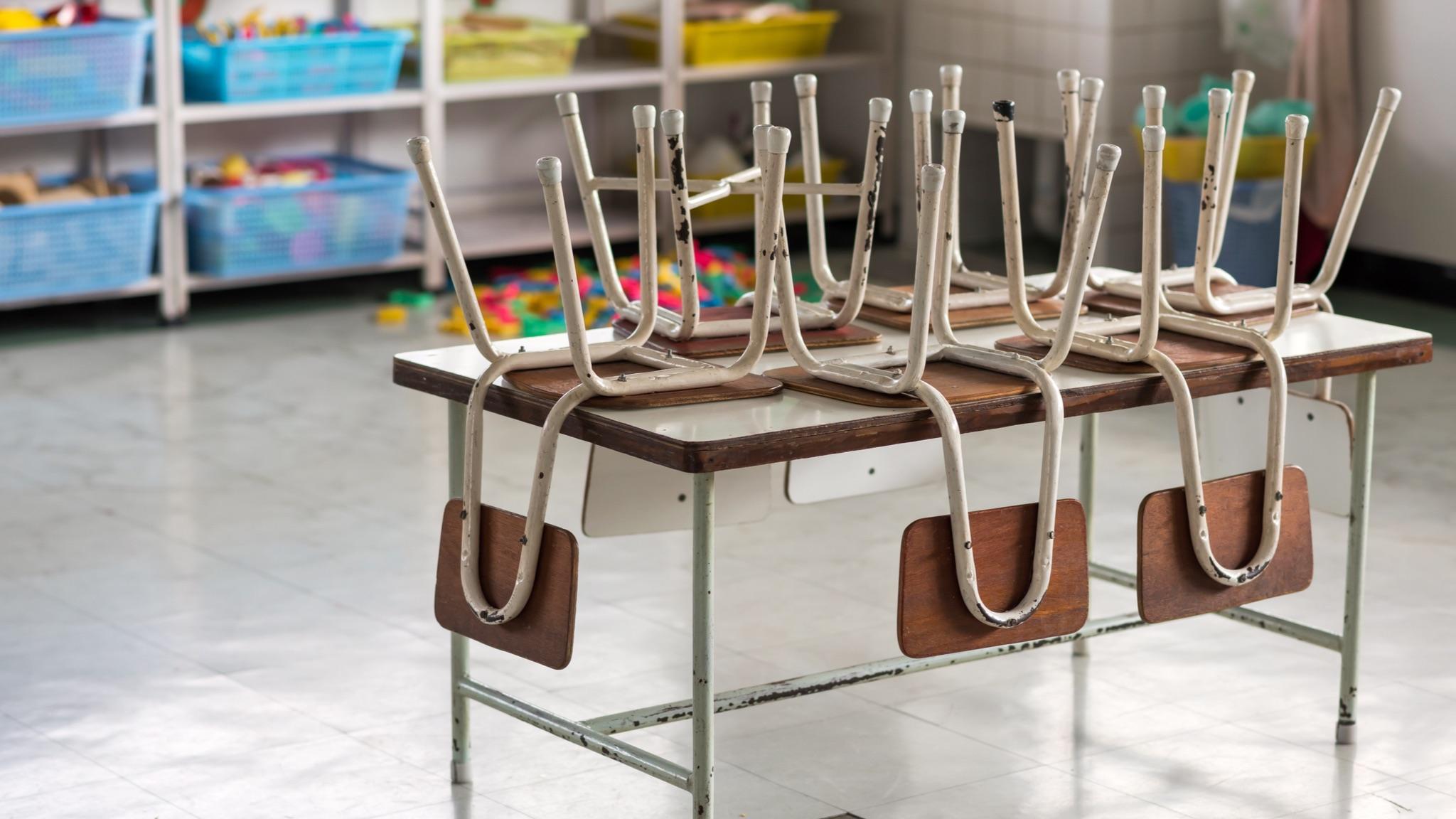Local universities set grade bar higher for NI students
- Published
- comments

Northern Ireland students need higher A-level grades for a place in some popular courses at local universities than students from Great Britain.
For example, NI students need three As at A-level for law at Queen's University. GB students need three Bs.
The university's clearing website lists courses and grades needed , externaldepending on where the student is from.
Both Queen's and Ulster universities said this was due to a cap on numbers of NI/EU students.
Clearing is where applicants are matched to university places that have not been filled.
On the QUB clearing website, students from Northern Ireland who want to study Politics, Philosophy and Economics need three As while those from Great Britain have been told that they can get in with two As and a C or three Bs.
In a statement, QUB said that the Northern Ireland Assembly sets student number controls for NI and EU students attending Northern Ireland universities because tuition fees are partially funded by the Department for the Economy.
This is referred to as the Maximum Student Numbers cap - the MaSN.
"The MaSN does not include international students or students from England, Scotland, Wales and the Islands (GB), whose tuition fees are not funded - these students are admitted in addition to the MaSN cap.
"Therefore, these places do not displace local or EU students.
"As there is no specified limit of places for GB or international students, it is possible for more GB and international students to apply through clearing. Consequently, a greater degree of flexibility can be exercised in terms of the grades accepted, though the quality is still high."
QUB said that NI and EU students holding offers may also be admitted with slightly lower grades than specified, subject to the availability of places.
The situation was "fluid", they said.
Ulster University said the situation was down to the cap. It said GB student offers were separate to the maximum numbers imposed on Northern Ireland students by the government.

"Places offered to English, Scottish and Welsh students will not displace or disadvantage any Northern Ireland student," the university said.
"The mix of GB and international students studying, living and working alongside local students enhances the student experience and builds a diverse student community.
But Ellen Fearon, president of the National Union of Students and Union of Students in Ireland, said it was up to the government to ensure anyone who wants to study locally is given a fair chance.
"The number of people from Northern Ireland who can go to university here is capped," she said.
"This means that, every year, thousands upon thousands of students who applied to study in the north end up leaving the country to study elsewhere and research has found that two-thirds of them never return," she said.
"If the government really wants to invest in the future of Northern Ireland, they should be prioritising education and making sure that anyone who wants to study here has a fair chance to."
The fee system means that students from GB pay much more for their qualification than those from Northern Ireland or the rest of the EU.
Guaranteed places
Students from NI pay £4,395 for an undergraduate course whereas GB students pay £9,250.
International students can pay anything from £16,900 to £41,850 per year.
Queen's University of Belfast (QUB) has already offered guaranteed places to about 2,500 Northern Irish students before they received their A-level results.
The university said the "unprecedented step" would "reduce anxiety and provide clarity for young people".
These places represent about 70% of QUB's 2020 intake of NI undergraduates.
Following the QUB decision, Ulster University said it would also guarantee places where appropriate.
Both Queen's and Ulster universities had previously said they could face multi-million-pound losses due to the coronavirus pandemic.
A-level exams were cancelled in Northern Ireland, Wales and England in 2020 with results based on "calculated grades" instead.
A-level results are due to be awarded on Thursday.
- Published9 July 2020

- Published16 April 2020

- Published28 October 2018
